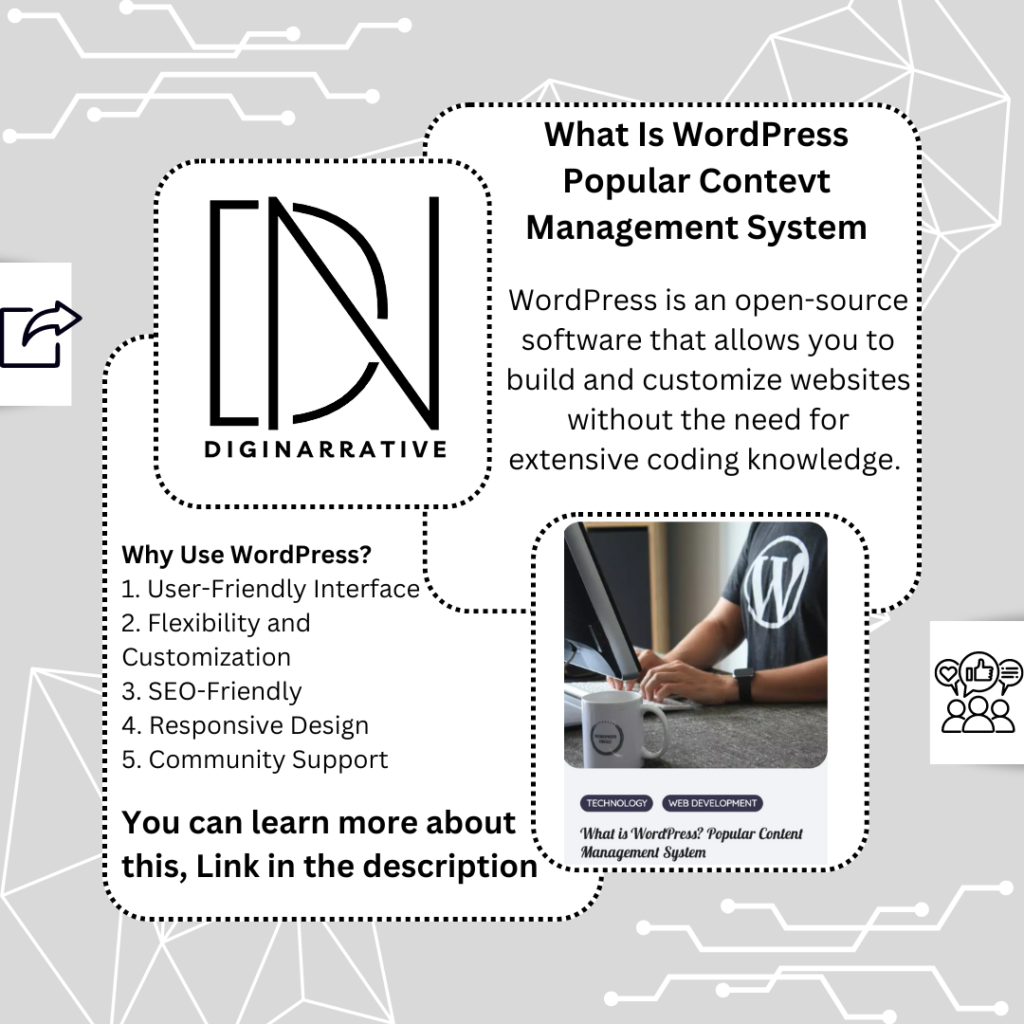Introduction
WordPress is a widely used content management system (CMS) that powers millions of websites around the world. Whether you’re a blogger, an entrepreneur, or a business owner, WordPress offers a user-friendly platform to create and manage your online presence.
Introduction to CMS
A Content Management System (CMS) is a software application that enables users to create, manage, and modify content on a website without needing specialized technical knowledge. In essence, it simplifies the process of building and maintaining websites by providing user-friendly tools and interfaces.
Key Features of a CMS
Most CMS platforms come with a range of built-in features designed to streamline the web development process. These features typically include:
1. Content Creation and Editing: A CMS allows users to easily create and edit content using a WYSIWYG (What You See Is What You Get) editor. This makes it easy for non-technical users to update website content.
2. Content Organization: CMS platforms often provide tools for categorizing and tagging content, making it easier to organize and retrieve information.
3. User Management: A robust CMS allows for multiple user accounts, each with varying levels of access and permissions. This feature is especially useful for websites that have multiple contributors.
Benefits of Using a CMS
Implementing a Content Management System offers numerous advantages, including:
1. Efficiency: With a CMS, content updates and publishing can be done quickly and efficiently, without waiting for a developer.
2. Consistency: CMS platforms ensure that all content follows a consistent format, making the website look professional and well-organized.
3. Scalability: As your website grows, a CMS can easily accommodate additional content, users, and features without significant overhauls.
Popular CMS Platforms
There are several popular CMS platforms available, each with its own set of features and advantages. Some of the most widely used ones include:
1. WordPress: Known for its ease of use and extensive plugin ecosystem, WordPress is a versatile platform that can be used for anything from blogs to e-commerce sites.
2. Joomla: Joomla offers a good balance between user-friendliness and flexibility, making it suitable for more complex websites.
3. Drupal: Drupal is highly flexible and secure, often used for larger, enterprise-level websites.
In conclusion, a Content Management System (CMS) is an essential tool for efficient and effective website management. By understanding what a CMS is and the benefits it offers, you’ll be better equipped to choose the right platform for your needs.
What is WordPress?
At its core, WordPress is an open-source software that allows you to build and customize websites without the need for extensive coding knowledge. It provides a flexible and scalable framework that can be tailored to meet the unique needs of various industries and individuals.
Originally created as a blogging platform in 2003, WordPress has evolved into a full-fledged CMS that supports not only blogs but also e-commerce sites, portfolios, forums, and much more. Its versatility and ease of use have contributed to its immense popularity.
Key Features of WordPress
Some of the key features that make WordPress a powerful CMS include its flexibility, scalability, and SEO-friendly structure. WordPress allows for easy content management, with an intuitive dashboard where users can add, edit, and organize their content. The availability of numerous themes and plugins means that users can enhance their site’s functionality without needing to write any code. Moreover, WordPress is designed to be search engine friendly, which helps in improving the visibility of websites on search engine results pages.
Why Use WordPress?
There are several reasons why WordPress is the go-to choice for website creation:
User-Friendly Interface
One of the main advantages of WordPress is its intuitive and user-friendly interface. You don’t need to be a tech guru to navigate through the platform and create stunning websites. With its drag-and-drop functionality and customizable themes, you can have a professional-looking site up and running in no time.
Flexibility and Customization
WordPress offers a vast library of themes and plugins that allow you to customize your website to suit your specific needs. Whether you want to add a contact form, integrate social media feeds, or optimize your site for search engines, there’s a plugin for that. The flexibility of WordPress ensures that your website can grow and adapt as your business evolves.
SEO-Friendly
Search engine optimization (SEO) is crucial for increasing your website’s visibility in search engine results. WordPress provides a solid foundation for SEO, with features such as customizable permalinks, meta tags, and XML sitemaps. Additionally, there are numerous SEO plugins available that can further enhance your site’s performance in search rankings.
Responsive Design
In today’s mobile-driven world, having a responsive website is essential. WordPress offers a wide range of responsive themes that automatically adjust to different screen sizes, ensuring that your site looks great on desktops, tablets, and smartphones.
Community Support
WordPress has a vibrant and supportive community of developers, designers, and users who are always ready to help. Whether you’re looking for troubleshooting advice or seeking recommendations for the best plugins, you can rely on the WordPress community to provide guidance and support.
Conclusion
In conclusion, WordPress is a powerful and versatile content management system that empowers individuals and businesses to create stunning websites. With its user-friendly interface, customization options, and SEO-friendly features, WordPress has become the top choice for website creation. Whether you’re a beginner or an experienced web developer, WordPress offers a platform that is both accessible and scalable.
So, if you’re looking to establish a strong online presence, consider harnessing the power of WordPress to bring your ideas to life.














Pingback: Are WordPress Websites Free, Good, and Secure? - DigiNarrative
Pingback: Are WordPress Themes and Plugins Free? - DigiNarrative
Pingback: Can WordPress Create an App? - DigiNarrative
Pingback: Can WordPress Connect to a Database and Handle Large Databases? - DigiNarrative
Pingback: Can WordPress Make a Dynamic Website? - DigiNarrative
Pingback: The Rise of WordPress: A Journey to Popularity - DigiNarrative